Social movements arise to solve problems of inequality, injustice, exploitation and oppression. In other words, they are solutions to society-wide problems plaguing the many but not the few (i.e. the elites at the top of the wealth-power pyramid).
The basic assumption of social movements is that Utopia is within reach, if only the sources of the problems can be identified and remedied. Since inequality, injustice, exploitation and oppression arise from the asymmetry of power between the few (the financial and political elites) and the many, the solution is a reduction of the asymmetry; that is a tectonic realignment of the social structure that shifts some power—economic and/or political—from the few to the many.
In some instances, the power asymmetry is between ethnic or gender classes, or economic classes (for example, labor and the owners of capital).
Social movements are characterized by profound conflict because the beneficiaries of the power asymmetry resist the demands for a fairer share of the power and privileges, while those who’ve held the short end of the stick have tired of the asymmetry and refuse to back down.
Two dynamics assist a social, political and economic resolution that transfers power from those with too much power to those with too little power: 1) the engines of the economy have shifted productive capacity definitively in favor of those demanding their fair share of power, and 2) the elites recognize that their resistance to power-sharing invites a less predictable and thus far more dangerous open conflict with forces that have much less to lose and much more to gain.
In other words, ceding 40% of their wealth-power still conserves 60%, while stubborn resistance might trigger a revolution that takes 100% of their wealth-power.
History provides numerous examples of these dynamics. Once the primary sources of wealth-generation shifted from elite feudal landowners to merchants and industrialists, the wealth (and thus the political power) of the landed elites declined. As the industrialists hired vast numbers of laborers drawn from small farms and workshops, this mass industrialized labor became the source of the wealth generation; after decades of conflict, this labor class gained a significant share of the wealth and political power.
The civil rights and women’s liberation movements realigned the political and economic power of minorities and females more in line with their productive output, reducing the asymmetries of ethnic and gender privileges.
In broad-brush, progressive social movements seek to broaden opportunities and level the playing field by reducing the asymmetric privileges of dominant classes defined by power and privilege. The core mechanism of this transition is the recognition and granting of universal human rights: the right to vote, the right to equal opportunity, and rights to economic security, i.e. entitlements that are extended universally to all citizens for education, healthcare, old-age pensions and income security.
Again in broad-brush, these movements have largely been categorized as politically Left, though many institutions deemed conservative (for example, various churches) have often provided bedrock support for progressive movements.
Social movements which seek to limit the excesses of state power tend to be categorized as conservative or politically Right, as they seek to realign the asymmetry of power held by the state in favor of the individual, family and the traditional social order.
The Expanding Pie Fueled Expanding Entitlements
Writer Ugo Bardi recently drew another distinction between Left and Right social movements: “Traditionally, the Left has emphasized rights while the Right has emphasized duties.”
As rights manifested as economic entitlements rather than political (civil liberty) entitlements, rights accrue economic costs. As Bardi observes: “Having rights is nicer than having duties, but the problem is that human rights have a cost and that this cost was paid, so far, by fossil fuels. Now that fossil fuels are on their way out, who's going to pay?”
I would argue that the cost was also paid by higher productivity enabled by the technological, financial and social innovations of the Third Industrial Revolution, roughly speaking the interconnected advances of the second half of the 20th century.
These advances can be characterized as expanding the economic pie; that is, generating more energy, credit, technological tools, opportunities, security and capital (which includes financial, infrastructural, intellectual and social capital) for all to share in a socio-political-financial allocation broad enough to make everyone feel like they were making some forward progress.
This long-term, secular expansion of the pie naturally generated more demands for additional entitlements and rights, as the economy could clearly support the extra costs of allocating additional wealth and resources to the many. From the point of view of the few (the elites), their own wealth continued expanding, so there was little resistance to expanding retirement, education and healthcare entitlements.
But in the 21st century, the expansion of the pie stagnated, and for many, it reversed. Adjusted for real-world inflation many households have seen their net incomes and wealth decline in the past decade.
Despite the endless media rah-rah about “growth” and “recovery,” it is self-evident to anyone who bothers to look beneath the surface of this facile PR that the pie is now shrinking. This dynamic is increasing inequality rather than reducing it.
The Shrinking Pie And Stagnant Productivity
It is a truism of economics that widespread increases in productivity are required to generate equally widespread increases in income and capital, i.e. productive wealth. To the consternation of many, productivity has stagnated since 2010; no wonder household income for all but the upper crust has gone nowhere.
If we glance at a chart of productivity, we see a strong correlation with speculative investment bubbles (the dot-com and housing bubbles 1995-2005) and speculative spikes fueled by central bank monetary stimulus (2009-10). Absent bubbles and monumental excesses of central bank stimulus, productivity quickly sinks to its secular trend line: downwards.
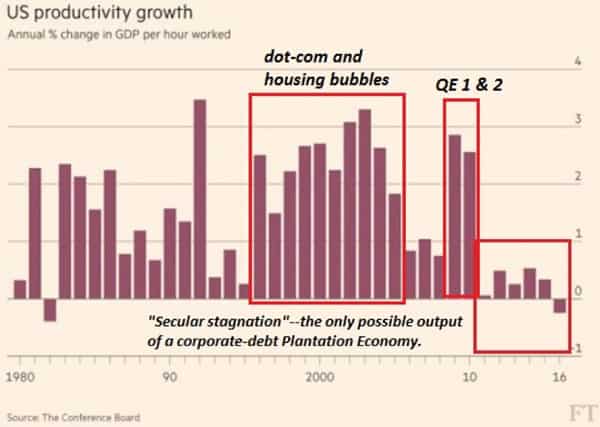
This next chart depicts the long-term trend line of productivity through all four industrial revolutions. Note the decline concurrent with the 4th Industrial Revolution (mobile telephony, the Internet, AI, robotics, peer-to-peer networks, etc.) and the depletion of cheap-to-access-and-refine oil:
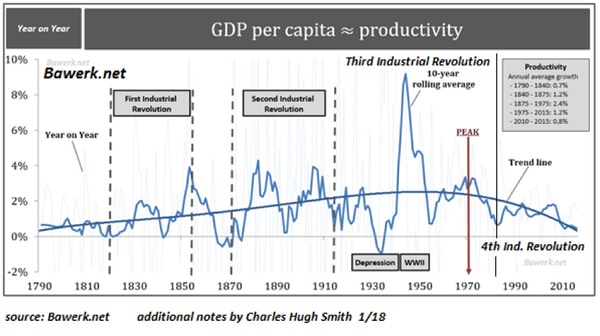
The unwelcome reality is that the economy is changing in fundamental ways that cannot be reversed with policy tweaks, protests or wishful thinking.
Consider the percentage of the gross domestic product (GDP) that goes to employee compensation (wages and salaried). Labor’s share of the GDP has been in a downtrend since 1970, which not coincidentally was the peak of secular productivity:
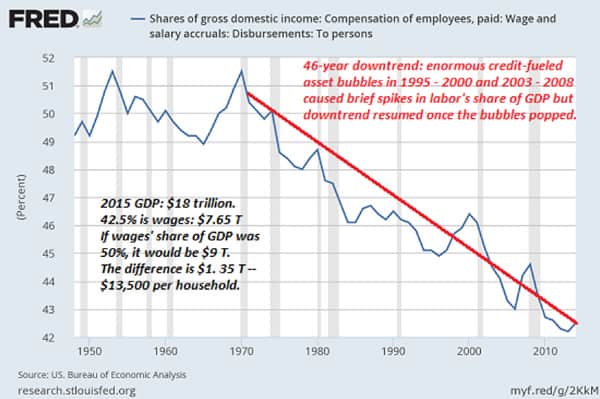
In this below chart of the distribution of wealth in the U.S., we find the same correlation to the downtrends in productivity and labor’s share of the economy. The bottom 90% of households' (the many) share of the wealth pie topped out in the early 1980s and has declined precipitously since, while the wealth of the top 0.1% (the few) has more than tripled since the late 1970s:
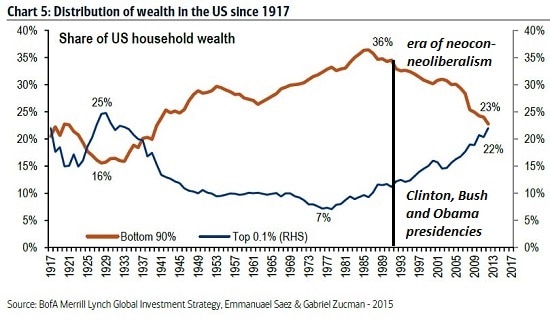
This next chart depicts the remarkable (and recent) spike income growth the few have recently enjoyed, at the expense of everyone else:
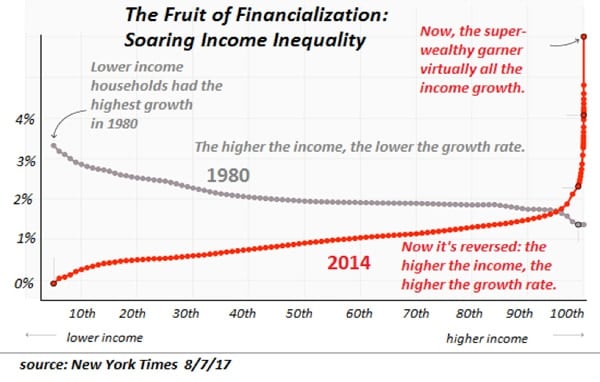
The increase in wealth and income inequality and the decline of productivity and labor’s share of GDP are the result of structural changes in the economy, changes with far-reaching consequences.
While it’s appealing to identify policies endorsed by self-serving insiders and elites as the source of these changes, that is far from the whole story. Much of this growing asymmetry stems from profound changes in the global economy that depreciate labor (as conventional labor is no longer scarce) and increase the gains of the top few in a “winner take most” allocation that benefits speculation, leverage and new ways of organizing labor and capital that reward the organizers far more than the users/participants.
In this new era of a steadily shrinking pie, the sources of inequality and related social problems have also shifted. As a result, the social movements that were effective in the past are no longer effective today. Attempts to address rising inequality with the old tools are fueling frustration rather than actual solutions.
In Part 2 — Social Unrest: The Boiling-Over Point, we examine why our existing models for social change have slipped into ineffectual symbolic gestures that fuel fragmentation and frustration -- and why that will lead to a dangerous boiling over of the 99% against the elites controlling the system.
When that happens (and it seems inevitable at our current trajectory), the rending of our social fabric will happen stunningly fast. The ensuing social disunity and disruption will be of the sort many alive today have never seen.
Click here to read Part 2 of this report (free executive summary, enrollment required for full access)
This is a companion discussion topic for the original entry at https://peakprosperity.com/the-pie-is-shrinking-so-much-the-99-are-beginning-to-starve/